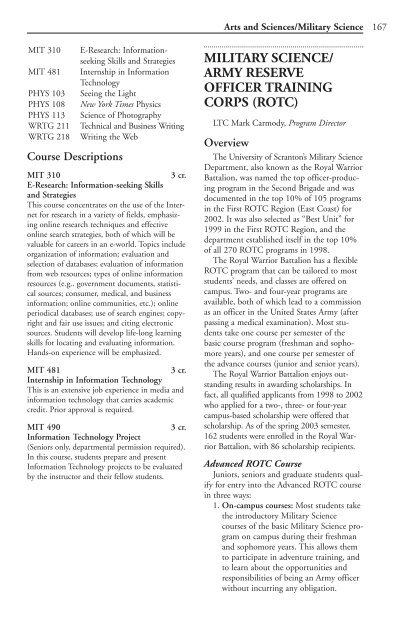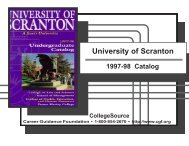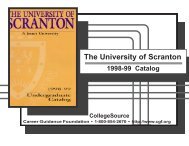2003-2004 - The University of Scranton
2003-2004 - The University of Scranton
2003-2004 - The University of Scranton
You also want an ePaper? Increase the reach of your titles
YUMPU automatically turns print PDFs into web optimized ePapers that Google loves.
MIT 310 E-Research: Informationseeking<br />
Skills and Strategies<br />
MIT 481 Internship in Information<br />
Technology<br />
PHYS 103 Seeing the Light<br />
PHYS 108 New York Times Physics<br />
PHYS 113 Science <strong>of</strong> Photography<br />
WRTG 211 Technical and Business Writing<br />
WRTG 218 Writing the Web<br />
Course Descriptions<br />
MIT 310 3 cr.<br />
E-Research: Information-seeking Skills<br />
and Strategies<br />
This course concentrates on the use <strong>of</strong> the Internet<br />
for research in a variety <strong>of</strong> fields, emphasizing<br />
online research techniques and effective<br />
online search strategies, both <strong>of</strong> which will be<br />
valuable for careers in an e-world. Topics include<br />
organization <strong>of</strong> information; evaluation and<br />
selection <strong>of</strong> databases; evaluation <strong>of</strong> information<br />
from web resources; types <strong>of</strong> online information<br />
resources (e.g.. government documents, statistical<br />
sources; consumer, medical, and business<br />
information; online communities, etc.); online<br />
periodical databases; use <strong>of</strong> search engines; copyright<br />
and fair use issues; and citing electronic<br />
sources. Students will develop life-long learning<br />
skills for locating and evaluating information.<br />
Hands-on experience will be emphasized.<br />
MIT 481 3 cr.<br />
Internship in Information Technology<br />
This is an extensive job experience in media and<br />
information technology that carries academic<br />
credit. Prior approval is required.<br />
MIT 490 3 cr.<br />
Information Technology Project<br />
(Seniors only, departmental permission required).<br />
In this course, students prepare and present<br />
Information Technology projects to be evaluated<br />
by the instructor and their fellow students.<br />
Arts and Sciences/Military Science 167<br />
MILITARY SCIENCE/<br />
ARMY RESERVE<br />
OFFICER TRAINING<br />
CORPS (ROTC)<br />
LTC Mark Carmody, Program Director<br />
Overview<br />
<strong>The</strong> <strong>University</strong> <strong>of</strong> <strong>Scranton</strong>’s Military Science<br />
Department, also known as the Royal Warrior<br />
Battalion, was named the top <strong>of</strong>ficer-producing<br />
program in the Second Brigade and was<br />
documented in the top 10% <strong>of</strong> 105 programs<br />
in the First ROTC Region (East Coast) for<br />
2002. It was also selected as “Best Unit” for<br />
1999 in the First ROTC Region, and the<br />
department established itself in the top 10%<br />
<strong>of</strong> all 270 ROTC programs in 1998.<br />
<strong>The</strong> Royal Warrior Battalion has a flexible<br />
ROTC program that can be tailored to most<br />
students’ needs, and classes are <strong>of</strong>fered on<br />
campus. Two- and four-year programs are<br />
available, both <strong>of</strong> which lead to a commission<br />
as an <strong>of</strong>ficer in the United States Army (after<br />
passing a medical examination). Most students<br />
take one course per semester <strong>of</strong> the<br />
basic course program (freshman and sophomore<br />
years), and one course per semester <strong>of</strong><br />
the advance courses (junior and senior years).<br />
<strong>The</strong> Royal Warrior Battalion enjoys outstanding<br />
results in awarding scholarships. In<br />
fact, all qualified applicants from 1998 to 2002<br />
who applied for a two-, three- or four-year<br />
campus-based scholarship were <strong>of</strong>fered that<br />
scholarship. As <strong>of</strong> the spring <strong>2003</strong> semester,<br />
162 students were enrolled in the Royal Warrior<br />
Battalion, with 86 scholarship recipients.<br />
Advanced ROTC Course<br />
Juniors, seniors and graduate students qualify<br />
for entry into the Advanced ROTC course<br />
in three ways:<br />
1. On-campus courses: Most students take<br />
the introductory Military Science<br />
courses <strong>of</strong> the basic Military Science program<br />
on campus during their freshman<br />
and sophomore years. This allows them<br />
to participate in adventure training, and<br />
to learn about the opportunities and<br />
responsibilities <strong>of</strong> being an Army <strong>of</strong>ficer<br />
without incurring any obligation.
















